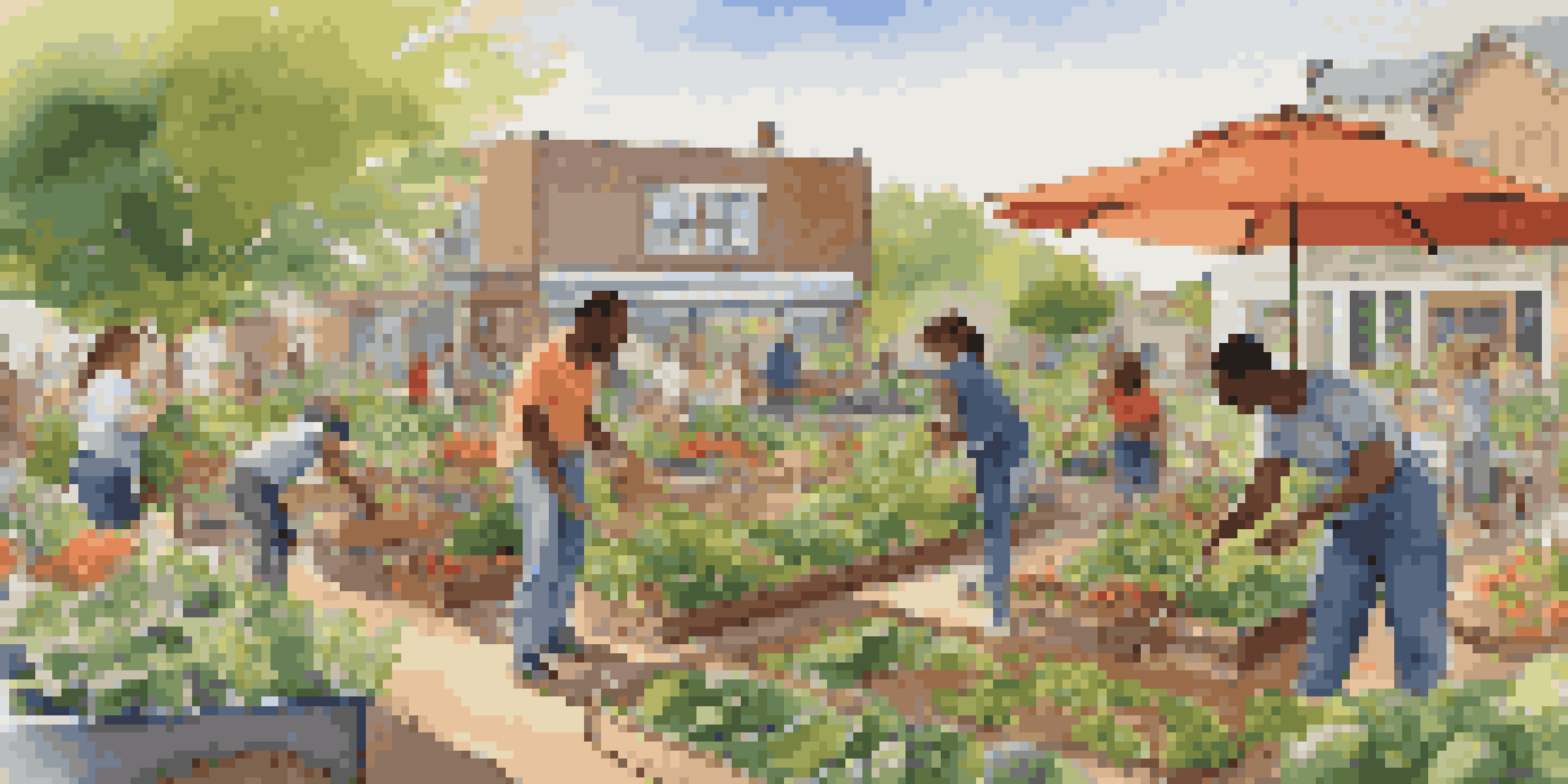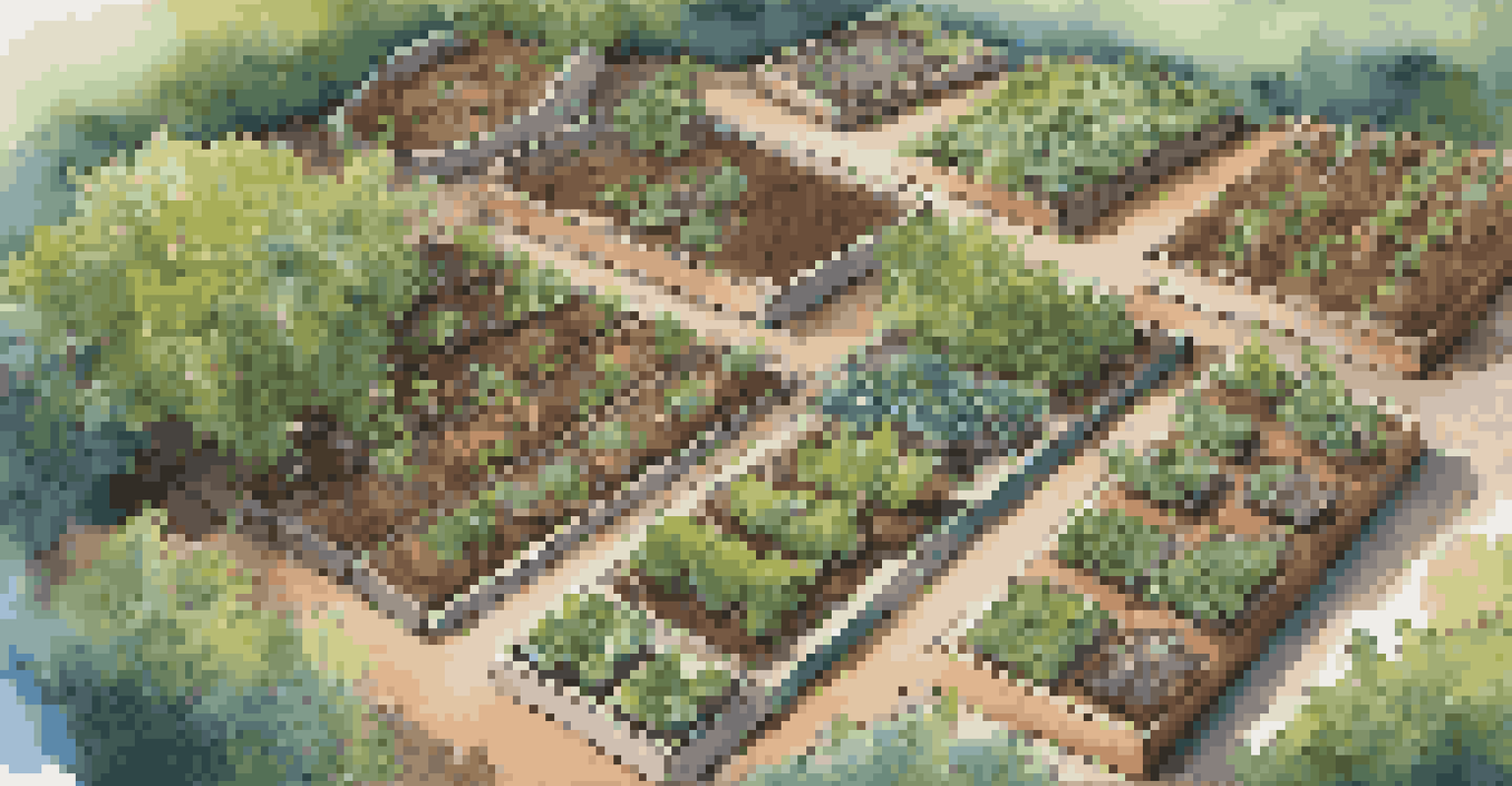The Connection Between Community Gardening and Physical Health

Understanding Community Gardening and Its Appeal
Community gardening refers to the practice of cultivating a shared garden space, often in urban areas. These gardens can be a place where neighbors come together to grow vegetables, fruits, and flowers, fostering a sense of community. Beyond just being a hobby, community gardening creates a vibrant social network that builds friendships and connections among participants.
To plant a garden is to believe in tomorrow.
The appeal of these gardens lies in their ability to transform unused land into productive spaces. Imagine a vacant lot bursting with colorful plants and fresh produce instead of weeds and debris. This transformation not only beautifies the area but also provides fresh food options, making it an enticing choice for many.
As more people get involved, they often find themselves not just gardening but also engaging in various activities that promote a healthy lifestyle. From planning crop rotations to participating in seasonal harvests, community gardening offers a hands-on approach to wellness that can be both rewarding and energizing.
Physical Activity: The Core Benefit of Gardening
Gardening is inherently a physical activity, requiring movement, strength, and endurance. Whether you're digging, planting, weeding, or harvesting, each task engages different muscle groups, providing a full-body workout. This kind of moderate exercise can help improve cardiovascular health and overall physical fitness.

Moreover, the act of gardening can burn calories, making it an effective way to stay fit. For instance, an hour of gardening can burn around 200 to 400 calories, depending on the intensity of the work. This means that not only are you producing healthy food, but you're also working towards your fitness goals.
Community Gardens Foster Connections
Community gardens create a vibrant social network, bringing together individuals from diverse backgrounds to share experiences and build lasting friendships.
Additionally, the variety of movements involved in gardening can enhance flexibility and coordination. As you reach for high branches or squat to pull weeds, you're naturally stretching your body, which can lead to improved mobility and reduced risk of injury in everyday activities.
Connecting with Nature: Mental Health Benefits
Spending time in nature has been shown to reduce stress and anxiety levels significantly. Community gardening provides a perfect opportunity to immerse oneself in a green environment, surrounded by the sights and sounds of nature. This connection can lead to a calming effect, allowing individuals to unwind and rejuvenate.
Gardening adds years to your life and life to your years.
Furthermore, gardening has a therapeutic aspect that can be incredibly beneficial for mental health. As you tend to plants, the repetitive motions and focus can serve as a form of mindfulness, helping clear the mind and promote relaxation. It's a simple yet effective way to practice self-care.
The social aspect of community gardening also plays a crucial role in mental well-being. Working alongside others fosters a sense of belonging and support, reducing feelings of loneliness and isolation. Sharing experiences and successes with fellow gardeners can create lasting friendships and a stronger community bond.
Nutritional Benefits of Growing Your Own Food
One of the most significant advantages of community gardening is access to fresh, organic produce. Growing your own fruits and vegetables means you can enjoy nutrient-dense foods straight from the garden. This not only promotes healthier eating habits but also encourages individuals to try new recipes and cuisines based on the seasonal harvest.
Additionally, gardening allows for control over what pesticides or fertilizers are used, making it easier to cultivate chemical-free produce. This empowerment over food sources can lead to a more conscious approach to nutrition and health. Plus, knowing exactly where your food comes from adds an extra layer of satisfaction.
Gardening Boosts Physical Health
Engaging in community gardening provides a full-body workout, helping participants improve their physical fitness while growing fresh produce.
Growing your own food can also introduce variety into your diet. Many gardeners are inspired to plant unique or heirloom varieties of vegetables and herbs that might not be available at local stores. This diversity can enhance meals and provide opportunities to explore new flavors and cooking techniques.
Community Engagement and Building Social Connections
Community gardening is an excellent way to foster social connections among diverse groups of people. These shared spaces often bring together individuals from various backgrounds, creating opportunities for cultural exchange and learning. This interaction promotes understanding and unity within the community.
Engaging with neighbors in gardening activities can also lead to collaborative projects, such as workshops or community events. These gatherings not only strengthen relationships but also provide valuable learning experiences, whether it's about gardening techniques or sustainability practices.
Moreover, participating in a community garden can instill a sense of pride and ownership in local spaces. As gardeners work together to beautify and maintain the garden, they develop a vested interest in their surroundings, leading to a more vibrant and cohesive community.
Environmental Impact of Community Gardening
Community gardens play a crucial role in promoting environmental sustainability. By transforming vacant lots into green spaces, they help combat urban heat, improve air quality, and reduce stormwater runoff. This ecological impact is essential for creating healthier urban environments.
Furthermore, community gardening encourages biodiversity by providing habitats for various species, including pollinators like bees and butterflies. These gardens can serve as vital ecosystems, contributing to the overall health of the environment. The more diverse the plant life, the more resilient the ecosystem becomes.
Mental Health Benefits of Gardening
Spending time in community gardens promotes mental well-being through stress reduction, mindfulness, and a sense of belonging among participants.
By practicing sustainable gardening methods, participants can also learn about eco-friendly practices. Techniques such as composting, organic pest control, and crop rotation not only benefit the garden but also educate individuals on how to live more sustainably in their daily lives.
Challenges and Solutions in Community Gardening
Despite the many benefits, community gardening does come with its own set of challenges. Issues such as limited space, varying levels of commitment among participants, and access to resources can hinder a garden's success. Recognizing these challenges is crucial for creating effective solutions.
One possible solution is to implement effective communication strategies among participants. Regular meetings and clear roles can help ensure that everyone is on the same page and feels valued in the gardening process. Additionally, sharing resources and knowledge can empower all members of the community garden.

Another approach is to foster partnerships with local organizations or businesses. By securing grants, donations, or sponsorships, community gardens can gain access to necessary tools, supplies, and educational workshops. These collaborations can strengthen the garden's overall sustainability and impact.
Conclusion: The Holistic Benefits of Community Gardening
In conclusion, community gardening offers a holistic approach to improving physical, mental, and social health. By engaging in gardening activities, individuals not only enhance their well-being but also contribute to a healthier community and environment. It's a win-win situation that encourages a lifestyle rooted in wellness and connection.
Ultimately, the benefits of community gardening extend far beyond the garden itself. The friendships formed, the knowledge shared, and the fresh produce harvested create a ripple effect that can positively impact individuals and communities alike. This collective effort is what makes community gardening such a powerful tool for change.
So, whether you're a seasoned gardener or a curious beginner, consider joining or starting a community garden. Embrace the opportunity to grow not just plants, but also relationships, health, and a stronger community spirit.